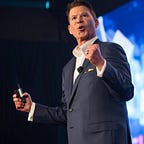7 Bright Examples of How Technology Can be Used for Good
By: Keith Krach
DocuSign, the San Francisco-based e-signature and digital transaction management (DTM) company, has built extensive experience in making document collaboration simple and efficient for some 250,000 corporate clients — and 85 million individual users — around the world. The company’s Transaction Rooms create a virtual space for authorized users to come together to create, modify, share, and archive documents within a secure cloud-based environment.
But DocuSign is changing the way the world works in other ways. Through its nonprofit arm, DocuSign IMPACT, the company has partnered with others in its field, as well as with leading nongovernmental organizations (NGOs), to offer help to people affected by natural disasters, whenever and wherever they occur.
Here are the ways DocuSign and some of its collaborators in the technology field are working to help make the world a better place, one byte at a time:
1. DocuSign
In September 2016, DocuSign announced that as part of its responsibilities as a member of the Clinton Global Initiative, its IMPACT foundation would be using technology to speed up the assistance available in disaster relief efforts. Among other initiatives, the company offers charitable organizations its DTM and e-signature platforms at reduced cost, works with partners to create cutting-edge disaster relief applications, and provides three working days off each year for staff to spend volunteering.
In order to further these efforts, the DocuSign IMPACT advisory board has expanded to include seven new members. The board now includes representation from groups such as the Natural Resources Defense Council, the Corporate Eco Forum, and the transformative community-building organization New Story.
DocuSign is also among the founding members of ImpactCloud, an alliance of cloud-based tech firms that have pledged to use their know-how to help nonprofits deliver humanitarian aid faster, more efficiently, and more cost-effectively.
The Nethope Solutions Center, which strives to unite the power of humanitarian organizations with that of technology, acts as the online host for ImpactCloud. The other ImpactCloud members, most also headquartered in the Bay Area, include Salesforce.org, Box, Splunk, Okta, Tableau, and Twilio, working alongside their nonprofit partners.
2. Salesforce.org
Salesforce, like DocuSign, is a San Francisco-based company that works to leverage its mobility and universal accessibility to assist NGOs in global emergency situations. The American Red Cross is one of many groups that have successfully used the giant customer relationship management company to help maximize their ability to communicate and to manage donations and data. Among other specific tasks, the Salesforce team has helped the Red Cross bring information together from hundreds of units in the field and a wide array of partners nationwide.
Grameen Foundation, which works to fight poverty in the developing world, has used analytics and development tools from Salesforce to create a collection of Android-synched outreach and data gathering apps.
3. Box
The file-sharing and cloud storage company Box pledges its technology, skill, and time to further the work of first responders and aid organizations. Thanks to Box tech and dedication, disaster relief groups can better get their teams mobilized with common access to vital information.
Team Rubicon Global, which facilitates collaboration between armed forces veterans and first responders to more quickly disseminate disaster-related aid, is focused on providing Box to its tens of thousands of volunteers, who will benefit from the information-sharing efforts during and after a disaster.
4. Splunk
Operational intelligence company Splunk, through Splunk4good, offers a central portal for the aggregation and analysis of data across a variety of device, hardware, and network types. This ability is particularly useful when quick response times can save lives. Like DocuSign’s products, Splunk’s offer the capacity for integrating seamlessly with an organization’s legacy information technology systems. This makes it an excellent choice for any NGO that needs to quickly share data and get boots on the ground.
5. Okta
Okta, a provider of identity and mobility management platform technology, announced in 2016 its pledge to allow nonprofits access to the products available in its identity cloud system, free of charge (for up to 25 employees).
Okta can be particularly valuable to crisis responders, in that it securely connects users to their mobile devices seamlessly and instantly through e-mail, data, and other technology, using capabilities such as social authentication and single sign-on. Human rights and aid organizations, in particular, are often the targets of cyberattacks, so they require the type of secure online spaces that Okta provides.
6. Tableau
Tableau, the only ImpactCloud company not based in the Bay Area, operates out of Seattle. The data visualization provider offers simple-to-use, visually centered analytics that an organization can make available to anyone in its network. Humanitarian aid teams can use Tableau to produce and disseminate visualizations of key information within minutes, increasing their ability to manage the often enormous amount of data surrounding a disaster situation, and respond with agility.
The Tableau Foundation, established in 2014, also offers grants for disaster relief in communities where the company operates. Initial grants went to two global health care innovation groups to assist teams in using mobile and visualization technology to help fight diseases such as Ebola and HIV.
7. Twilio
Twilio’s platform helps embed phone, voice, messaging, and video communications into mobile, desktop-based, and online software. Its ability to enhance SMS messaging, phone calls, and login authentication can offer aid groups the ability to communicate clearly and rapidly, and thus save lives.
The company donates and discounts its products to nonprofits such as the Red Cross, Doctors Without Borders, and a variety of community revitalization groups in the United States. Thanks to Twilio.org, anyone can now deploy customized apps designed in response to individual needs on the ground.
